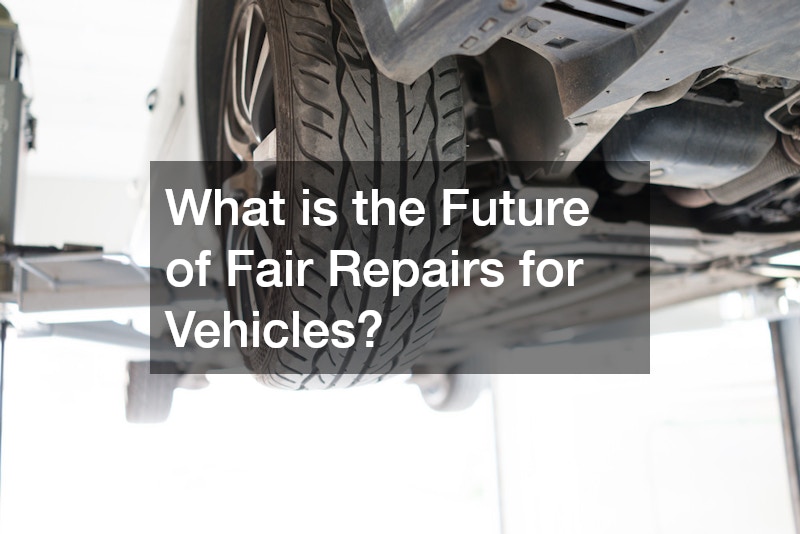The automotive industry is constantly evolving, and one crucial aspect often overlooked is the accessibility and fairness of vehicle repair services. This article delves into the significance of easy and fair repairs, highlighting how they empower vehicle owners, protect consumer rights, and contribute to a sustainable future. By exploring the intricacies of fair repair laws, identifying reliable repair shops, and understanding common repairs, readers will gain valuable insights into the world of auto repair services. Given the complexity of modern vehicles, achieving transparency and fairness in repairs is essential not only for individual consumers but for fleet repair services as well, ensuring all vehicles are maintained efficiently and ethically. Beyond individual interest, fair repairs also significantly impact environmental conservation by promoting repairs over replacements, thereby reducing waste. By addressing issues such as warranty impacts and the use of digital tools, this article aims to provide a comprehensive overview of how fair repairs can shape the future of vehicle maintenance across the globe.
What Are Fair Repair Laws?

Fair repair laws, often referred to as “Right to Repair,” are essential regulations that grant vehicle owners and independent repair shops the ability to access information, tools, and parts necessary to perform repairs on their vehicles. These laws are designed to foster competition within the auto repair industry, leveling the playing field between large manufacturers and independent service providers. By enabling access to crucial information and parts, fair repair laws empower consumers and provide them with more choices in selecting repair services.
At the heart of fair repairs is the principle that consumers should not be forced to rely solely on manufacturers for vehicle maintenance. Independent auto repair shops and fleet repair services can offer more competitive pricing and faster services when armed with the necessary resources to conduct repairs. Ensuring that these entities have access to official repair guidelines and tools minimizes monopolistic practices by large automakers and leads to a healthier, more competitive market.
The push for fair repair laws is gathering momentum as more stakeholders recognize their long-term benefits. Legislation is being considered and adopted worldwide, with some regions having already implemented comprehensive statutes. As more jurisdictions embrace these reforms, consumers can expect to see improvements in service quality, fair pricing, and overall transparency when dealing with auto repairs.
Why Are Fair Repairs Important for Vehicle Owners?
For vehicle owners, the importance of fair repairs cannot be overstated. They ensure that repair services are accessible, affordable, and transparent, thereby demystifying the auto repair process for consumers. Access to fair repairs allows vehicle owners to make informed decisions about maintenance and repairs, ensuring they aren’t exploited by overpriced services or subpar quality repairs.
Fleet repair services especially benefit from fair repair laws, as they manage multiple vehicles and depend on cost-effective and reliable repair solutions. These services must keep vehicles functioning optimally to meet operational requirements, and fair repairs facilitate a streamlined maintenance process. By having access to multiple repair options, fleet services can choose the most efficient solution without exclusive dependence on high-priced manufacturers.
Fair repairs also safeguard vehicle owners from being stuck in lengthy and costly repair cycles. Access to clear information and competitive services means that issues are addressed promptly and accurately. Consumers are empowered to engage in preventative maintenance by understanding common repair needs and leveraging the full array of available repair services.
How to Identify Reliable Repair Shops?
Finding a reliable repair shop is crucial for vehicle owners to ensure trustworthiness and expertise. A good starting point is to seek recommendations from family and friends who have had positive experiences with auto repair services. Reviews and ratings on reputable platforms can also provide insight into a shop’s reliability and customer service.
For specific repairs like driveshaft repairs, it’s important to choose a shop with certified and experienced technicians known for their expertise in that particular area. Certifications from recognized institutions assure that the repair work will comply with industry standards and be completed professionally. Vehicle owners should also consider whether a repair shop is transparent about pricing and provides detailed estimates before commencing any work.
Another method of identifying a reliable shop is to check for affiliations with industry associations or engagement in continued training programs. Shops that emphasize staying updated with the latest repair techniques and technologies are generally more committed to offering quality service. This commitment will likely carry over to all aspects of their operations, ensuring fair repairs for all customers.
What Common Repairs Can Be Done at Home?

Home repairs provide vehicle owners with cost-effective options for addressing minor issues and performing routine maintenance. Some common tasks, such as changing oil and filters, replacing spark plugs, and swapping out batteries, can often be performed without professional assistance. These home repairs save time and money while empowering owners through a hands-on approach to vehicle care.
When considering foreign car repair at home, owners should be particularly cautious and ensure that they have access to appropriate tools and instructions. Certain foreign models may require specialized knowledge or parts that aren’t readily available in regular home toolkits. However, with proper research and resources, vehicle owners can complete these tasks while enjoying the benefits of fair repairs.
Home repairs not only provide economic advantages but also offer educational opportunities. By working on their vehicles, owners gain a deeper understanding of their car’s mechanics, helping them diagnose issues better in the future. This hands-on experience complements the principles of fair repairs by equipping consumers with knowledge and independence.
How to Ensure Fair Pricing for Car Repairs?
Ensuring fair pricing for car repairs begins with obtaining transparent quotes from multiple service providers. Vehicle owners should ask for detailed estimates that break down labor costs, parts, and miscellaneous fees. This approach allows consumers to compare prices and make more informed decisions regarding their repair needs.
For repairs involving complex systems like hydraulic repair services, it’s essential to partner with professionals who offer detailed explanations and justify each part of their pricing. Preferential pricing models shouldn’t obscure the actual costs associated with repair work. Through open discussions with repair providers, vehicle owners can better grasp what constitutes a fair price in their specific situation.
Moreover, ensuring fair repairs extends beyond initial estimates. It involves checking for any hidden costs or unnecessary upselling practices. Vehicle owners should feel comfortable asking questions and requesting justification when additional work is suggested. By actively engaging with repair processes, consumers reinforce the market’s move towards upright and honest transactions.
What Are the Most Common Car Repairs?
Common car repairs encompass a wide range of services that address everyday wear and tear experienced by vehicles. Among these, brake repair often tops the list due to its essential role in vehicle safety and performance. Regular inspection and replacement of brake components ensure smooth operation and help prevent more costly future repairs.
Another frequent repair need arises from minor accidents, necessitating services from a collision repair center. Dents, scratches, and bumper replacements are typically managed by such facilities to restore a vehicle’s appearance and functionality. Ensuring fair repairs in these contexts spreads awareness about vehicle insurance and claims, benefiting both individual and fleet vehicle services.
Finally, as vehicles age, issues with the transmission system are common, requiring specialized attention. Transmission repair can be costly if not identified early, so regular check-ups are advised to prevent severe damage. Staying alert to transmission issues helps maintain vehicle longevity and reduces the need for extensive repairs.
How Do Warranties Affect Fair Repairs?

Warranties play a significant role in the landscape of fair repairs, as they determine where and how vehicle owners can seek repair services. Manufacturer-imposed conditions may restrict vehicle owners from using designated service centers for repairs, impacting their ability to choose independent service providers. Warranties can protect consumers from high repair costs but may also limit their autonomy.
In cases where auto body service is needed, warranties may dictate specific repair processes and parts usage. Vehicle owners should review warranty terms carefully to understand their rights regarding repair options. By balancing warranty benefits with the need for fair repairs, consumers can navigate their options more effectively.
Some regions and laws promote warranty reforms to support fair repairs, allowing consumers greater freedom to select non-manufacturer services without voiding warranty terms. This move encourages healthy competition and wider access to reliable repair solutions. As these reforms gain traction, vehicle owners stand to benefit from enhanced, affordable repair services.
Are There Digital Tools for Facilitating Repairs?
The advent of digital tools has transformed the auto repair landscape, providing both consumers and repair providers with advanced resources to facilitate fair repairs. Diagnostic apps and digital manuals offer detailed insights into vehicle systems, making it easier to identify potential issues before they escalate. These technological aids empower vehicle owners to take charge of their repair needs.
Transmission repair, for example, can significantly benefit from digital diagnostic tools, which help pinpoint specific issues quickly and accurately. By leveraging these tools, both professionals and DIY enthusiasts can save time and costs typically associated with traditional diagnosis methods. Such advancements illustrate the importance of integrating technology into the pursuit of fair repair practices.
Moreover, digital marketplaces and platforms enable consumers to compare repair service offerings, prices, and reviews transparently. These platforms democratize access to repair services, allowing for more informed decisions and ensuring fair repair practices across the industry. The ongoing development and adoption of digital tools represent a promising future for automotive care, emphasizing efficiency, accuracy, and transparency.
How Do Fair Repairs Benefit the Environment?
Fair repairs are not only beneficial to consumers but also significantly impact environmental sustainability. By promoting the repair of existing vehicles rather than replacing them, fair repair practices reduce waste and conserve resources. Car hail damage repair and other similar services ensure that minimal environmental footprints are left by focusing on reparation over replacement.
Additionally, ensuring that vehicles are well-maintained through fair repairs can lead to improved fuel efficiency and reduced emissions. Routine maintenance tasks such as brake repair and timely replacement of worn parts are crucial for optimal vehicle performance. This proactive approach supports environmental goals by curbing unnecessary fuel consumption and pollution.
Waste reduction is a central tenet of fair repairs, as discarded parts and vehicles contribute to landfill waste. By extending the lifecycle of vehicle components, fair repair practices lessen the demand for new parts manufacturing, conserving energy and raw materials. Through these actions, fair repairs align the auto industry with broader environmental conservation efforts.
What is the Future of Fair Repairs for Vehicles?

The future of fair repairs in the automotive world promises continued advancements in regulatory frameworks and technological innovations. Emerging legislation aims to further level the playing field for independent repair shops and vehicle owners, giving them more access to necessary tools and information. As the fair repair movement gains global momentum, increased consumer education and empowerment are expected.
Technological growth in the form of smarter vehicles and digital repair aids is poised to redefine conventional repair approaches. Modern vehicles integrate complex software systems that require precise diagnostic tools for fair repair practices. The continued evolution of these technologies will enable more efficient and accurate repair processes, enhancing the overall consumer experience.
The ongoing trend towards sustainability will also shape the future of fair repairs. As the world focuses on reducing carbon footprints and waste, fair repair models will play a central role in promoting resource conservation within the automotive sector. By embracing environmentally responsible repairs, the industry contributes to a sustainable legacy for future generations.
Incorporating These Fair Repairs
In conclusion, easy and fair repairs are an integral aspect of modern vehicle ownership, offering numerous advantages for consumers and the environment alike. By ensuring transparent and equitable services, fair repairs safeguard consumer interests and foster a competitive automotive repair industry. As more regions adopt fair repair laws, vehicle owners and fleet repair services alike gain greater autonomy and cost-effective options for maintaining their vehicles.
The importance of fair repairs extends beyond individual concerns, as well-maintained vehicles result in environmental benefits such as reduced emissions and prolonged usable lifespans for auto parts. The automotive industry’s focus on improving repair practices illustrates a commitment to protecting both consumer rights and environmental interests.
